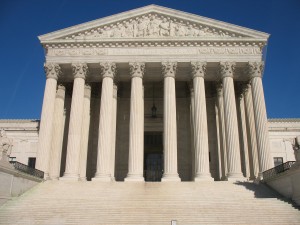By Ross Parker
ticklethewire.com
Tough sledding for the Supreme Court in February with oral arguments on five thorny criminal justice cases.
Judicial Bias : What was he thinking? In Williams v. Pennsylvania the DA of Philadelphia, Ronald Castille, personally authorized the pursuit of the death penalty against Terrence Williams in connection with the office’s prosecution for a brutal murder. Williams was tried, convicted and sentenced to death. Castille supervised the direct appeal, which was denied. During post-conviction proceedings, with Castille still heading the office, a lower court found that his office had violated the Brady rule in failing to turn over exculpatory evidence during the penalty phase (that Williams had been abused along with other minors by the victim) and in presenting false argument.
Shortly thereafter Castille ran for election to the Pennsylvania Supreme Court and boasted during the campaign that he had personally sent Williams and others to death row. He won the election. By the time the case reached the state supreme court, Castille had become the Chief Justice.
Incredibly, Castille refused to recuse himself from the case when the appeal arrived in the Pennsylvania Supreme Court. The court unanimously reversed the lower court and reinstated the death sentence. Chief Justice Castille wrote a scathing concurring opinion criticizing the Defender’s Office as “ringmasters, with their parrots and puppets as a side show.”
Prediction: Reverse. It is astounding that this guy failed to appreciate that his direct participation in the case created a risk that he could not decide it fairly. The appearance of actual and potential bias was obvious particularly when the issue was his former office’s misconduct.
The voters should turn him out of office. He has damaged the reputation of good prosecutors and judges, as well as the reputation of the state’s highest court. The remedy for the Supreme Court is the conundrum. Merely remanding the case to the Pennsylvania Supreme Court without Castille sitting on the case seems hardly enough. A different vote by the other Justices is an admission of that they were previously influenced by Castille’s involvement, but reaffirming their former votes smacks of continued injustice.
Search Attenuation Doctrine: In Utah v. Strieff the issue is whether evidence seized incident to a lawful arrest on an outstanding warrant should be suppressed because the investigative stop was not supported by reasonable suspicion or probable cause.
The officers had some reason after surveillance to stop the defendant’s vehicle on suspicion of drug dealing, but the information did not meet the reasonable suspicion standard. To their happy surprise, however, after the stop they learned that there was already an arrest warrant outstanding. A search incident to that arrest produced evidence. However the Utah courts threw the evidence out and tossed the case. A great law school exam case.
Soon after the Warren Court applied the exclusionary rule to prohibit evidence resulting from unlawful police action, it became apparent that there were circumstances where the application of the rule would not serve its purpose of deterrence. Exceptions were carved out, including standing, inevitable discovery, good faith, independent source and collateral uses.
The exception at issue in Strieff is the attenuation doctrine. Evidence which would not have been obtained but for official misconduct is not inadmissible if the causal connection with the acquisition is sufficiently attenuated. If the officers acted in good faith and their actions did not affect the justification for the search, the taint of the conduct is purged. That is, unless you are a cop in Utah or Nevada.
Other jurisdictions have held that, as in Strieff, if there was no flagrant misconduct and the officer had no control over the intervening circumstances (here the existence of a warrant), the attenuation doctrine should be applied to bar the exclusionary rule’s application. The courts are all over the map on how to apply the factors of the doctrine and are badly in need of the Court’s re-direction.
Prediction: Reverse. The Utah police officers acted in good faith, were just shy of having enough information for a legal stop, and had no control over the existence of the warrant. No purpose would be served by excluding the evidence.
Hobbs Act Interstate Commerce Element: A prosecutor friend once said that interstate commerce was the last refuge of the Hobb, meaning that if a criminal defendant in a Hobbs Act prosecution was relying on the argument that there had been no proof that the robbery affected interstate commerce, he was in desperate straits. With the principles of de minimis, depletion of assets, aggregation, and, in attempt cases, targeting, there is precious little left for a drug rip-off artist like the defendant in Taylor v. United States to rely upon for this long-shot defense.
The Court will decide if the government has to prove the interstate commerce element in Hobbs Act cases where the robbery of a drug dealer is an inherent economic enterprise affecting commerce.
Taylor broke into two houses in Roanoke, Va., where he thought he could rob drugs and drug proceeds. He found none and left with a few dollars and a couple cell phones. In his Hobbs Act trial he wanted to argue that robbing drug dealers of marijuana grown in Virginia would have no effect on interstate commerce and therefore the evidence was insufficient. The trial court and the 4th Circuit, however, held that drug dealing in the aggregate affects interstate commerce, particularly where a defendant targets drug dealers. Drug dealing is an enterprise which inherently satisfies the element as a matter of law.
Two other circuits (2nd and 7th) take a different approach, requiring the jury to make an individualized decision on the interstate commerce element in drug robbery cases rather than the court make a per se finding.
Prediction Affirmed: Whether anything remains of the interstate commerce element in Hobbs Act cases involving the robbery of a drug dealer is a tough call actually. I don’t think the Court will go as far as the 4th Circuit in Taylor. However, if the opinion is limited to the sufficiency of the evidence, Taylor did attempt to rob drug dealers, without regard to the source of their product. Affirmed by a close margin. (I’ve changed this prediction 3 times already.)
Recklessness as a Mens Rea in Unlawful Firearms Possession: In the 4th case for February argument, Voisine v United States, the issue is whether a misdemeanor crime with a mens rea of recklessness (rather that intentional or knowing) qualifies as predicate crime of domestic violence under the federal statute barring the possession of firearms by prohibited persons.
The defendants were each convicted of misdemeanors assaults involving domestic members and were charged under the Maine statute and doing so intentionally, knowingly or recklessly. Some years later they were found to possess rifles, one having shot a bald eagle, and convicted of illegal possession of a firearm by a prohibited person under 18 USC 921(a)(33)A .
On appeal the Supreme Court vacated the convictions and remanded for reconsideration in light of last year’s decision in Castleman. That case held that in this statute Congress intended that the actus reus (wrongful acts) of common law battery applied and noted but did not decide whether the mens rea requirement of battery (intentional not reckless) also applied to the predicate crime. The 1st Circuit reinstated the convictions and said the acts were kosher, that recklessness was an adequate mens rea, and so here we are back again with Chief Justice Roberts and Company.
Prediction: Reverse There are some complicating factors in the record, like the 1st Circuit finding “volitional” elements in Maine’s recklessness mental element etc. But if the Court focuses on the root issue, I think they will make the 2nd Amendment folks happy by disqualifying predicate crimes with a reckless state of mind from the federal statute. As the dissenting judge noted in the remand decision, the majority of the lower court seemed to be result-oriented in their discussion of what the law should be because of the dangers of domestic violence.
Sex Offender Registration: The fifth and mercifully the final case, Nichols v. United States, is another law school exam question. The defendants were two convicted sex offenders who lived on opposite sides of the Missouri River, one in Kansas (think 10th Circuit) and one in Missouri (8th Circuit). Both abandoned their residences and traveled to Kansas City International Airport and flew off to live in the Phillipines without registering as a convicted sex offender in the state of their former residence. The 8th Circuit said that this was not a violation of the registration statute and the 10th naturally disagreed.
The issue before the Court is whether the registration statute (SORNA) requires sex offenders who reside in a foreign country to update his registration in the jurisdiction in which he formerly resided and, secondly, whether the statute is an unconstitutional delegation of legislative authority to the executive branch since it grants the Attorney General discretion on who to prosecute.
The case turns upon the construction of the registration statute and whether it intended to impose a federal obligation to notify the jurisdiction the offender is leaving of his departure to a new foreign residence. Although the statute does not plainly require such a notification, the 10th Circuit found one by construing the section requiring the offender to update his residence by his departure plans in the jurisdiction where he “resides.” The lower court found that this jurisdiction of where he resides included his abandoned residence in Kansas.
The federal statute was intended to impose minimum registration standards and procedures to make possible a national sex offender registry. Congress required the states to maintain a registration system, and it permitted the states to impose more stringent requirements. Only two states (West Virginia and Washington) explicitly require offenders who move to a foreign country to provide notification of that intention to the state he is leaving. The federal statute does not impose a requirement that an offender notify the jurisdiction he is leaving. That responsibility passed to the jurisdiction of his new residence. Since foreign countries are not included in the registration system, no duty to notify the former residence state is provided for.
Prediction: Affirm the 8th Circuit decision to reverse the conviction, reverse the 10th Circuit. Congress, intentionally or not, failed to clearly regulate the registration of a sex offender who leaves the U.S. to live in foreign countries, at least until and unless he returns. It could do so by legislating a notification requirement with the state the offender is leaving. Or the states could do so. But the strained statutory construction by the courts is not the way to do so.
That wraps up February. The guys and gals on the High Bench earn every penny of their $246,800 salary in these mind-bending exercises. Three either are in their 80s or will be within a month or two. Happy Birthday to Chief Justice Roberts who will be 61 this week. But don’t expect Justice Thomas to bring the cake.






